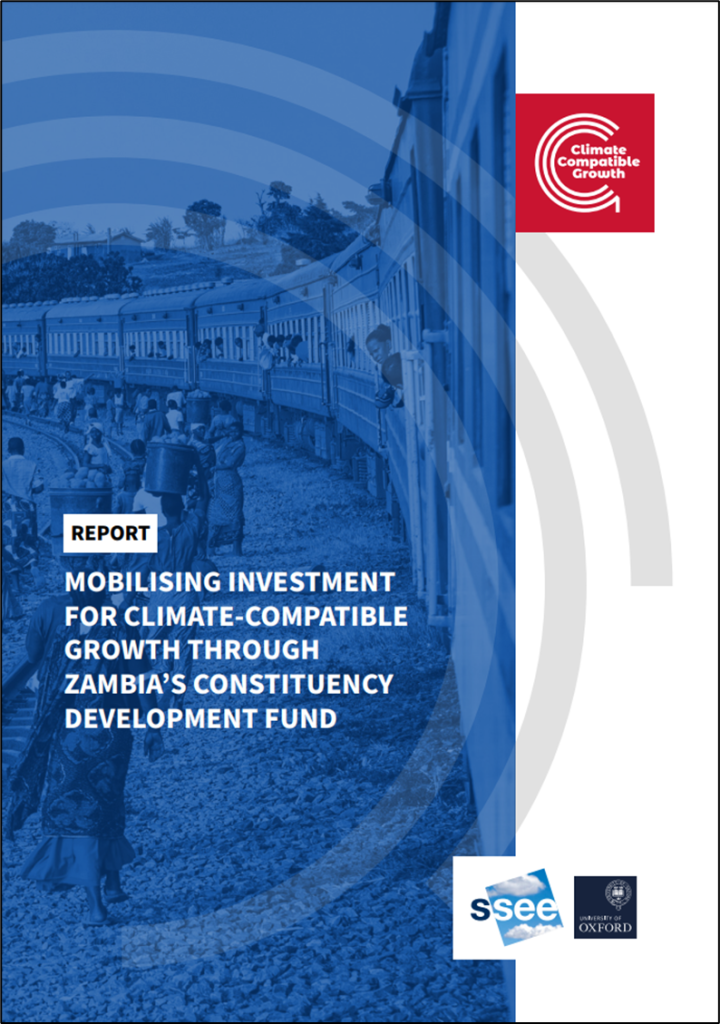New report shows how Constituency Development Fund can attract external funding for sustainable development in Zambia.
7th June 2023
Oxford, UK & Lusaka, Zambia. A new report from the University of Oxford’s Smith School of Enterprise and the Environment aims to help Zambia attract investment to support climate compatible growth. The report, published today, makes specific recommendations in relation to Zambia’s Constituency Development Fund (CDF).

The Oxford team spent three months evaluating how the CDF is working, including consulting community groups in urban and rural Zambia as well as members of parliament, traditional leaders, local media, central government, and others. They worked with colleagues from several Zambian organisations including Lloyds Financials Ltd, the University of Zambia, the Zambia Institute for Policy Analysis and Research (ZIPAR), the Alliance for Community Action, and the University of Lusaka. The report – Mobilising Investment for Climate–Compatible Growth Through Zambia’s Constituency Development Fund – was funded by the FCDO through the Climate Compatible Growth programme.
Dr Alex Money, who led the research project, commented: “Historically, factors such as high transaction costs and opaque governance have prevented devolved decision-making when it comes to investment in local communities. The CDF has recently been expanded and this presents an opportunity to mobilise external funding in support of sustainable, climate-friendly growth and development.”
Zambia, with a population of 20 million (which is predicted to double by 2050), is considered highly vulnerable to natural hazards associated with climate change. In addition, along with many other African countries, Zambia’s fiscal position has also been adversely affected by the COVID-19 pandemic, external geopolitical events, and challenges in meeting international debt service obligations.
Dr Sylvia Mwamba, a public finance expert from ZIPAR added: “Since 2022 the expanded CDF has breathed new life into Zambia’s inclusive and sustainable growth agenda, reenergizing local economies. It has also exposed weaknesses in the existing policy, institutional, and legislative arrangements for local governance, creating opportunities for reform. The Government has already taken steps to plug some of the gaps in the frameworks, repositioning the CDF as a potentially formidable mechanism for innovative financing, including climate finance. However, given Zambia’s strained public finances, sustaining the CDF will require being more deliberate about using CDF to mobilize external resources innovatively. This paper is very welcome because it makes evidence-based proposals for using the expanded CDF to unlock development financing and build fiscal buffers.”
Prof Lloyd Ching’ambo of Lloyds Financials commented: “The increase of the CDF from K1.4 million in 2021 to K25.7 million in the 2022 Budget Period, and now K28.3 million in 2023 has already demonstrated that the path towards the goal of a complete socio-economic transformation agenda of broad-based citizen participation is surely being achieved. While Zambia may be a poor sub-Saharan nation today, the path to prosperity is clear through this one key bold policy direction by the United Party for National Development (UPND) Government, that is devolved governance. With strong citizen-participation in the management of financial resources, Zambia can attract blended financing.”
Dr Money concluded: “The CDF could be a uniquely powerful instrument to mobilise ‘last mile’ investment from mechanisms such as an international loss and damage fund. Given other initiatives underway including the Devolution Support Program, the Decentralisation Implementation Plan, and the NDC Implementation Framework; 2023 could be a critical year for mobilising climate-friendly, decentralised investments into the Zambian economy.”
To read the report, which includes an executive summary, please visit: https://www.smithschool.ox.ac.uk/research/climate-compatible-growth